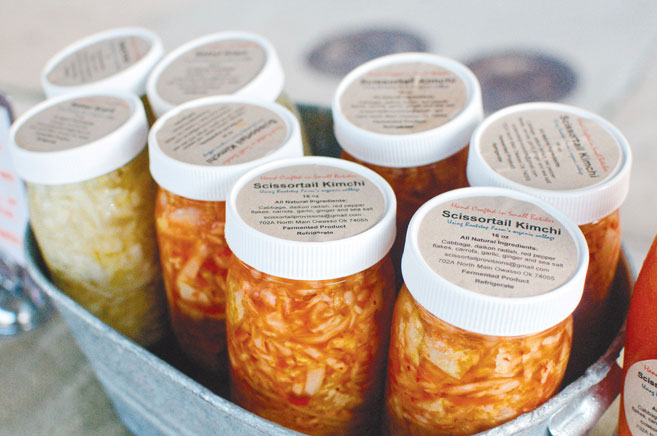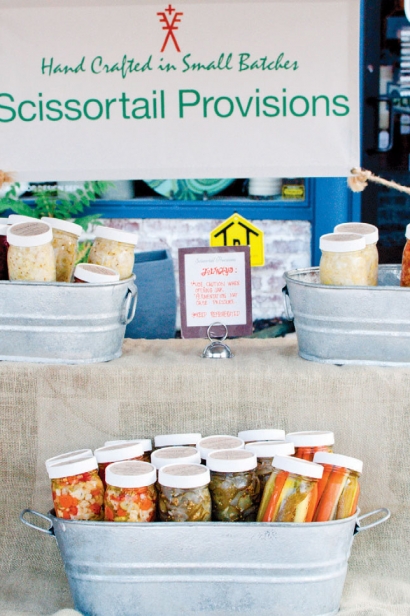The Best of What's Around
THE ALCHEMY OF PICKLING
Fermentation is magic in the hands of Scissortail Provisions
There’s a sign in the home base of Scissortail Provisions, written in chalk, that reads “If cooking is an art, and baking is a science—fermentation must be magic.” In the hands of Dale and Beverly Wissen, you believe it. And if fermentation is magic, then the Wissens can safely be said to be mad wizards of the craft.
Fermentation is the cultivation of good, healthful bacteria in an anaerobic environment to preserve foods while enhancing flavors, ending up at what fermentation guru Sandor Katz calls “the flavorful space between fresh and rotten.” And it’s not simply a method of preservation. The cultivation of these microorganisms—technically lactic-acid producing bacteria, falling under the banner of “probiotics”—have been shown, according to dozens of independent science and medical papers, to have myriad positive effects on the consumer’s body and mind, to the point where listing them all would almost be gratuitous. Just some of the benefits include improvements in intestinal health, a stronger immune system, increased resistance to allergies, illness, and lactose intolerance, cholesterol reduction, improved health of the skin and brain, resistance to obesity, and a reduced risk of certain cancers— and, if you can believe it, even more.
One almost wants to be skeptical about that. While there is no medical consensus as to exactly why these bacteria work so hard to keep you healthy, the evidence that probiotics are beneficial to human health is overwhelming. So, while the mechanisms that make fermented foods healthy is sometimes baffling to the layman, and even occasionally inscrutable to the scientist, the actual act of fermentation is conversely simple in practice, and at Scissortail, utterly elegant in execution.
The motto and M.O. at Scissortail is to make products hand-crafted in small batches, including pickles, relishes, chutneys, sauces hot and savory, kimchi, salsas, vinegars and other vegetables and fruits, often fermented. The price points are simple—they’re “the five dollar store,” and the portions they sell, jarred and bottled by hand, come in portions large enough to satisfy for weeks.
One Saturday, you get to see Dale take a bowl of chopped cabbage, carrots and daikon radish, squeeze out the juices with his hands until the vegetables are submerged in their own extracted water, mix in minimal spices and leave it to sit. The next Saturday, he sells you a jar of delicious kimchi.
Pulling bacteria out of the air of the environment it’s made in, every fermented product takes on an element of its birthplace, and of its inventors. “You can almost tell what family makes it,” Dale says, discussing the process and its unique appeal to Beverly and himself.
Dale began his forays into what would become Scissortail while working with James Shrader at the Palace Café, where he was given latitude to experiment and sell some of his creations as Palace Café products. He started with pickling and moved onto fermenting ribs of kale. Soon, a passion for fermentation began to take hold. The sheer variety of foods that can be created with the method is intoxicating. He read the books of Sandor Katz; recently, Dale and Beverly met the man himself when they traveled to Austin, Texas, for a fermentation festival, to learn more about the craft.
All this work, this research, these sojourns, has paid off. Their escabeche and kimchi are as good as I’ve had anywhere, as are their multiple sauerkrauts— sauerkrauts that have gotten thumbs-up for authenticity from people with palates that would know. And their products lend themselves nicely to a lively imagination in the kitchen.
According to Beverly, of some products, “People have asked us—how do you eat this?” But the possibilities are myriad; their offerings go well with eggs, salads, sandwiches, spread on bagels, served as dips or as sides unto themselves. Some Tulsa restaurants have even used Scissortail products in their own recipes, including the Blue Moon Café and Potbelly’s Pub and Grill, which for a time topped a sandwich of seared tuna with Scissortail’s peach chutney.
The business has sprouted up quickly over the course of the last year, following their recent retirements. “I spent too many years doing stuff, having a job,” Dale says. “And now all of a sudden I’ve all got this freedom—I do what I want to do.”
And what he does, essentially, is let fly with a bold improvisational style and an emphasis on aesthetics. He describes his ingredients with passion, from the shimmering red pepper flakes imported from Korea that he uses for the kimchi to the red onions from Three Springs Farm he saw at one market and found irresistible.
“I had to have them,” he says. They also have a working relationship with Wayne Jesko, of Bootstrap Farm, who provides many of the ingredients that become Scissortail’s products—getting a jar or two of the outcome in return, of course.
They use as few ingredients as possible, taking no shortcuts to flavor. And this is no mere marketing angle—they say they would feel morally compromised selling products that aren’t as good for you as they could be.
“Dale comes up with the greatest names, it’s really funny,” Beverly says, referring to one of their pickled products: the deep-green Dumbass Relish.
“We had [that], and we hated selling it,” Dale says, “because it had so much sugar.”
“It’s the least healthy thing that we make! And we felt bad.”
The original formulation was a great seller, but the sugar issue rankled. Dale went back to the lab with it to pare the content down. “I took like 70%, 75% of the sugar out of it,” he says with pride, both of them beaming. “We’re really conscientious about the healthy quality.”
The concerns for their business are not, primarily, the dollar. It’s more to do with their own happiness, contentment—a karmic joy at putting good things out into the world, where so many others are happy to value profit over quality as a matter of course.
There’s an undeniable peace of mind to knowing what you’re eating won’t hurt you—it’s funny, in a sad way, how often we make such bargains in our culture. As for Scissortail’s products, some of them couldn’t be any healthier for you. But so flavorful, so robust, and for a lot of the products, you can count the ingredients on one hand.
It’s an artistic way of doing things. It’s good science. Indeed, a kind of magic.







